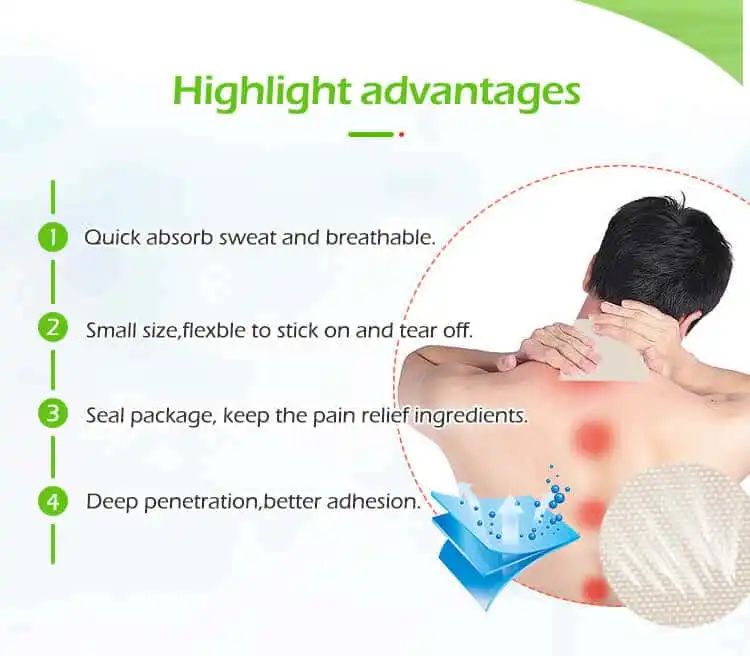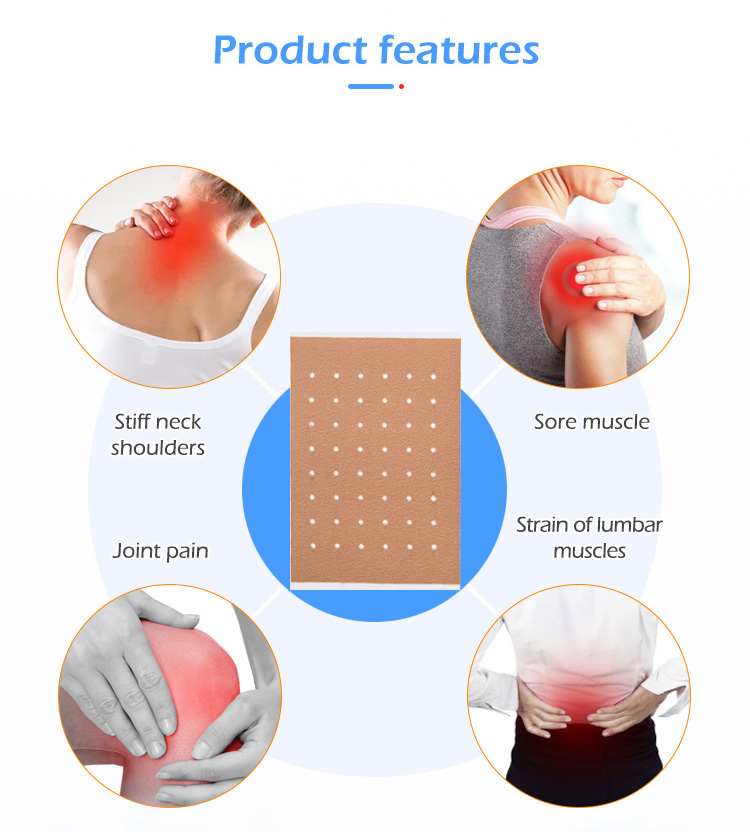What Certifications Should I Look for in an Inflammation Relief Patches Supplier?
In the rapidly growing market of topical healthcare products, Inflammation Relief Patches have become a trusted solution for consumers seeking non-invasive, effective relief from inflammation and pain. As a brand owner or entrepreneur, choosing the right Inflammation Relief Patches Supplier is crucial to ensure product quality, regulatory compliance, and consumer safety.

One of the most reliable ways to evaluate potential partners—including Inflammation Relief Patches Manufacturers, OEMs, and suppliers—is to review the certifications they hold. Certifications act as proof of adherence to industry standards, legal requirements, and quality assurance protocols. This article will discuss the essential certifications you should look for when selecting an Inflammation Relief Patches Supplier, and how these certifications help safeguard your brand’s reputation and growth.
Why Certifications Matter in Choosing an Inflammation Relief Patches Supplier
When you opt for a Custom Inflammation Relief Patches or Private Label Inflammation Relief Patches partner, you are entrusting them with the integrity and safety of the product that carries your brand name. Without proper certifications:
There is an increased risk of quality inconsistency.
Regulatory authorities may flag your products for non-compliance.
Consumer trust may be compromised due to safety concerns.
Market entry could be delayed or denied, especially in regulated countries.
Therefore, prioritizing certified suppliers is a strategic move that benefits your brand in the long term.
Key Certifications to Look for in an Inflammation Relief Patches Manufacturer or OEM
1. Good Manufacturing Practice (GMP) Certification
GMP certification is arguably the most important and recognized standard in the pharmaceutical, supplement, and medical device industries. It ensures that the Inflammation Relief Patches Manufacturer adheres to strict manufacturing protocols covering hygiene, process control, documentation, and staff training.
Why it matters: GMP guarantees consistent product quality, reduces contamination risk, and meets regulatory expectations globally.
How it helps your brand: Your products will have fewer defects and higher consumer satisfaction, which drives brand loyalty and compliance with retailers.
2. ISO 9001 Quality Management Certification
The ISO 9001 certification confirms that the supplier follows an internationally recognized quality management system (QMS). It focuses on improving operational efficiency, customer satisfaction, and continuous improvement.
Why it matters: It reflects the supplier’s commitment to quality control and process consistency.
How it helps your brand: Working with an ISO 9001-certified Inflammation Relief Patches OEM means you can expect reliable delivery, consistent quality, and better after-sales support.
3. FDA Registration and Compliance (For US Market)
If you plan to sell Private Label Inflammation Relief Patches in the United States, ensure your supplier complies with the FDA (Food and Drug Administration) regulations for medical devices or topical products.
Why it matters: FDA registration indicates legal compliance, product safety, and that the product is manufactured in FDA-registered facilities.
How it helps your brand: It facilitates smoother entry into the US market and builds consumer confidence, especially for health-related products.
4. CE Marking (For European Markets)
The CE mark certifies that the product complies with European health, safety, and environmental protection standards.
Why it matters: CE marking is mandatory for products sold within the European Economic Area (EEA).
How it helps your brand: A CE-certified Inflammation Relief Patches Manufacturer enables you to confidently export and market your products across Europe.
5. SGS or Third-Party Testing Certifications
Third-party testing and certification from organizations such as SGS (Société Générale de Surveillance) confirm the independent verification of product safety, ingredient authenticity, and performance.
Why it matters: It adds a layer of credibility and transparency about your Custom Inflammation Relief Patches’ claims.
How it helps your brand: Independent verification helps in marketing claims, reduces liability, and boosts consumer trust.
6. ISO 22716 – Cosmetic Good Manufacturing Practices (Cosmetic GMP)
Since many inflammation relief patches are classified under cosmetics or cosmeceuticals depending on ingredients and claims, ISO 22716 certification ensures compliance with cosmetic GMP.
Why it matters: It focuses on hygiene, traceability, and quality specific to cosmetic products.
How it helps your brand: If your Private Label Inflammation Relief Patches fall under cosmetics, this certification supports regulatory compliance and product safety.
7. Organic and Natural Certifications (If Applicable)
If you plan to develop Custom Inflammation Relief Patches using natural or organic ingredients, certifications such as USDA Organic, COSMOS, or ECOCERT may be crucial.
Why it matters: They guarantee that ingredients and production processes meet strict organic standards.
How it helps your brand: These certifications appeal to niche markets focused on clean-label, natural, or eco-friendly products, boosting brand differentiation.
Additional Considerations When Evaluating an Inflammation Relief Patches Supplier
Transparency and Traceability
A certified supplier should offer transparent documentation about ingredient sourcing, batch testing, and production processes. Traceability helps in managing recalls efficiently if needed and maintains consumer safety.
Regulatory Expertise
Suppliers with certifications typically have better expertise in navigating complex international regulatory environments. This ensures your Private Label Inflammation Relief Patches comply with different countries’ standards.
Quality Control Systems
Ensure the supplier implements robust quality control testing, including microbial tests, stability tests, and ingredient verification. Certifications often require these systems but verifying specific QC protocols is vital.
How Certifications Impact Your Brand Growth
Consumer Confidence: Certified products reassure consumers, leading to repeat purchases and positive reviews.
Retail Acceptance: Many retailers require suppliers to have valid certifications before carrying their products.
Market Expansion: Certified products have fewer barriers when entering international markets.
Risk Reduction: Certifications reduce the risk of product recalls, legal disputes, and reputational damage.
Competitive Advantage: Certifications differentiate your brand from competitors lacking verified quality assurances.
Conclusion
Selecting an Inflammation Relief Patches Supplier with the right certifications is foundational to building a trustworthy, high-quality product line that stands out in the crowded healthcare market. Certifications such as GMP, ISO 9001, FDA registration, and CE marking ensure regulatory compliance and product excellence, while additional certifications for organic or cosmetic standards can unlock niche markets.
By partnering with a certified Inflammation Relief Patches Manufacturer or OEM, you empower your brand with credibility, quality assurance, and smoother market access — all essential ingredients for sustainable growth and increased visibility.
Related Questions & Answers
Q1: Why is GMP certification critical for inflammation relief patches?
A: GMP ensures manufacturing consistency, product safety, and regulatory compliance, which directly impacts product quality and consumer trust.
Q2: Can I sell FDA-registered inflammation relief patches internationally?
A: Yes, FDA registration is specific to the US market but signals high quality that can facilitate acceptance in other countries.
Q3: What is the difference between ISO 9001 and ISO 22716?
A: ISO 9001 is a general quality management certification, while ISO 22716 is specific to cosmetic good manufacturing practices.
Q4: Do all inflammation relief patches require CE marking?
A: CE marking is mandatory for products sold in the European Economic Area (EEA) and depends on product classification and claims.
Q5: How do organic certifications benefit my custom inflammation relief patches?
A: Organic certifications appeal to health-conscious consumers and can justify premium pricing and market differentiation.
Q6: Are third-party testing certificates necessary if my supplier is certified?
A: Yes, third-party testing provides independent validation of product claims and safety, complementing supplier certifications.






